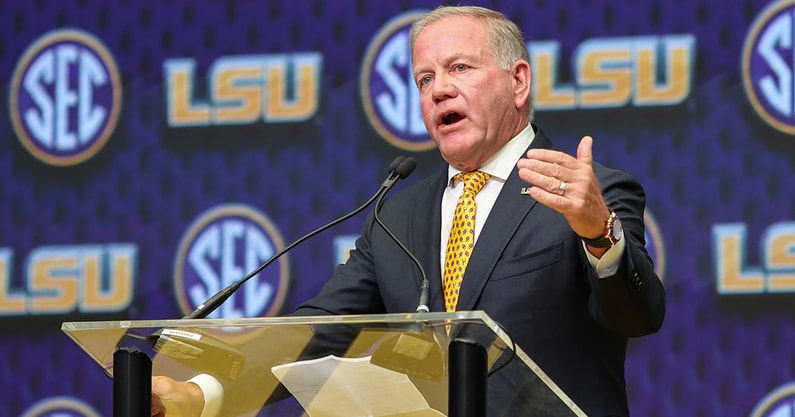Brian Kelly sets LSU roster cost at 'just about $18 million'

After an up-and-down 2024 season, Brian Kelly went to work overhauling the LSU roster. The Tigers went to work on both the high school and transfer portal recruiting trails, and Kelly shared just how much the roster costs this year.
Kelly said LSU is “going to be just about $18 million” during his first radio show of the year – lining up with the number On3’s Pete Nakos reported this spring. The Tigers brought in 18 transfers this cycle as part of the No. 2-ranked portal class, according to the On3 Team Transfer Portal Index, and also had a Top-10 high school recruiting class.
SUBSCRIBE to the On3 NIL and Sports Business Newsletter
In a survey conducted by On3 earlier this summer, LSU received five votes as one of the top spenders in the program. Sources told Nakos at the time that the Tigers’ spending also marked an “impressive” turnaround as Kelly looks to get the program to the College Football Playoff for the first time in his tenure.
Kelly pointed out the stark differences between the salary cap in place in the NFL – where the “big money” is – and in college. That’s when he shared how LSU’s roster cost compares.
“Look, the NFL is $280 million a year in salary cap. We’re going to be just about $18 million,” Kelly said. “There’s a big difference between $280 million and $18 million. So if you can’t see the difference between the two, then you’re not really understanding that what you want to develop your son to be is the best version of himself so he can get the big money in three years.
“It’s starting to resonate back to that. Be competitive with other offers that they may get, but at the end of the day, it’s still about showing them that if you come to LSU, we’re going to develop you in all facets. So when you leave here, not only are you a better player, you’re a better man, you’re a better person and you can go into an NFL locker room. … The NFL knows that. They know that if they go through our program here, not only are they really good players, but they’re prepared for that next step. And that next step is really important because they’re going to pay them a lot more money than we were paying them.”
Top 10
- 1New
Eli Drinkwitz comes clean
Knew rule was broken
- 2
Deion Sanders
Fires back at media
- 3Hot
Big 12 punishes ref crew
Costly mistake in Kansas-Mizzou
- 4Trending
CFP Top 25
Predicting Top 25 after Week 2
- 5
National Title odds
Numbers shift after Week 2
Get the Daily On3 Newsletter in your inbox every morning
By clicking "Subscribe to Newsletter", I agree to On3's Privacy Notice, Terms, and use of my personal information described therein.
Brian Kelly details LSU’s approach to front-loading deals
Earlier this offseason, Brian Kelly acknowledged LSU needed to improve its NIL support and dove in headfirst. He helped lead a major NIL initiative as he and his wife committed to match up to $1 million in donations with a gift to the school’s foundation, which resulted in $3.2 million raised for Bayou Traditions.
Kelly also said LSU’s approach, prior to House v. NCAA settlement approval, was to front-load deals. Upon final approval, the NIL Go clearinghouse went into effect to vet NIL deals worth more than $600. From there, the Tigers used revenue-sharing to enhance the amount of dollars the players received.
“I’ll go back to that, we had a plan that I think was advanced for everybody else and that was, we were going to front-load a lot of our players prior to revenue-sharing,” Kelly said. “We wouldn’t be in a position where we were, when we got to revenue-sharing, we couldn’t compete. A lot of this was front-loaded contractually where our players were able to – and for us, we were able to get to them before revenue-sharing, and then use revenue-sharing to kind of put them over the top.
“So pulling from both of those resources really allowed us, from a contractual standpoint, to get a little bit of a jump on the crowd, if you will, because everybody now sees that plan and will be using it. But it gave us a real boomerang effect in terms of recruiting and it helped us with our freshman recruiting, as well.”